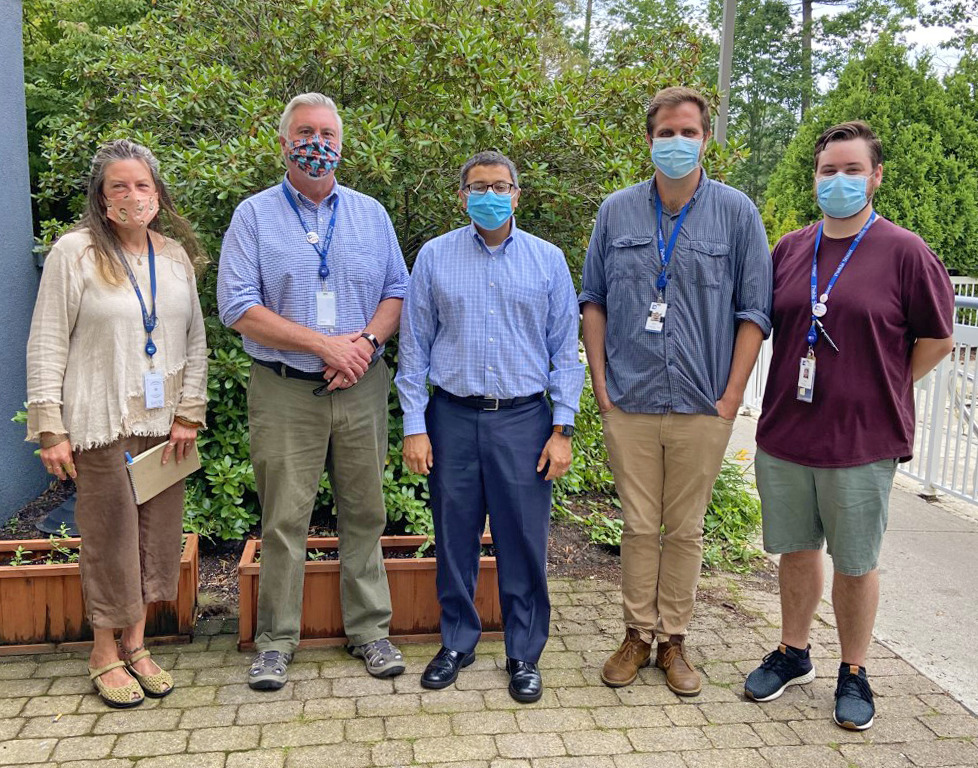By Sam Chamberlain (he/him), Managing Director of Preble Street Quarantine Shelters
Note: With funding from MaineHousing, Preble Street operated a Quarantine & Isolation (Q&I) Shelter in Scarborough from May 2020 through March 31, 2022. Because of decreased need, the state consolidated this service to Lewiston as of April 1, 2022.
As social workers — and people inspired to help others, it is not in our nature to sit back and watch. We stand up and take action. The beginning of the COVID-19 pandemic was no different. None of us knew what we were walking into, but we stood up and said, “I’m ready.”
Countless messages implored everyone to stay home to “flatten the curve” in the early days of the pandemic, but that concept was predicated on the idea that everyone had the ability to socially distance and isolate when needed. What about the many individuals and families without a home? Or folks in densely populated housing, or healthcare workers and emergency responders? What could be done to ensure all of these people stayed safe as well?
Quickly, Preble Street, the State of Maine, and other local partners worked together to open a temporary Wellness Shelter — more on that here — as well as hotel-based quarantine shelters that pulled on both professional social work intervention and medical health monitoring.
A never-before-done task was in front of us: develop a low-barrier Quarantine and Isolation shelter in a local hotel to respond to a pandemic that we are learning about as we go. And Preble Street leadership and social workers said, “Yes! Let’s do it!”
Over the last 22 months, 800 individuals were served at the Quarantine and Isolation shelter (Q & I), amounting to more than 900 unique quarantine stays, and more than 7,500 bed nights. That’s 7,500 nights that someone did not need to worry about where they were going to quarantine while sick with or exposed to COVID-19. That’s more than 800 individuals who had access to safe shelter, reducing the spread of COVID-19 and helping keep our communities safe during these incredibly difficult times.
One of the most remarkable things that I had the honor of experiencing while overseeing the Q & I shelters were the truly incredible partnerships that developed. Nobody was doing Quarantine and Isolation shelter work 24 months ago — nobody had developed the logistics systems. We had to build those.
Collaboration and communication across social service agencies is always key to providing the best service possible to clients, and this certainly rang true for this endeavor. From daily meals to transportation, to medical support, to social-emotional support, to prescription pickups, to culturally appropriate meals and service delivery, and so much more, partnerships were key in the delivery of safe, low-barrier, and culturally appropriate quarantine and isolation services.
I was amazed and my heart filled every single time we called on a partner for support. Never was a call made and met with a “No, I don’t think that’s possible.” It was always: “Hmm, I’m not sure — let’s figure out how to make that happen.” It was truly a beautiful example of what coordinated partnership in response can look like.
Looking back on my time overseeing Quarantine and Isolation shelters in Maine, I learned:
- Access to dignified shelter and professional social work services is imperative. While in quarantine, having access to professional social work staff allowed folks to start permanency planning or finding longer-term shelter resources upon discharge.
- Requesting that someone quarantine or isolate for 10-14 days is a huge ask, especially when the ability to leverage technology for connection is limited. It’s important to remind ourselves to show complete compassion and acceptance and to provide all the support that one might need to meet expectations.
- Access to medical care is essential. Medical providers expanded their scope beyond just COVID-19 symptom monitoring and offered medical education, wound care, medical referrals, and highly compassionate care. This was essential for supporting someone while in quarantine.
- This wouldn’t have been possible without collaboration across agencies. Strong partnerships built on trust, respect, and open communication are the only way that a Quarantine and Isolation shelter of this size could have worked.
The pandemic taught me so much about love for your neighbors, holding unconditional positive regard for everyone around you, and the importance of both social work and shelter for public health. The first years of the pandemic were hard and scary, but we knew we needed to ensure people had a safe place to stay. It further solidified the idea that shelter and housing are human rights. Everyone deserves housing. Period.
At Preble Street, we use the word “love” to describe how we do our work. That word was essential in figuring out how to deliver quarantine and isolation services when there were few answers to what we were facing. For every single thing we did, we asked the question, “Is what we are doing showing love and respect for the people who are using this service?”
That was our job during COVID, just as it was before and will be in the future: show our neighbors love, keep them safe, and give them hope.
Pictured above: Dr. Nirav Shah (he/him), Maine CDC Director (center), visits the Preble Street Quarantine and Isolation shelter in July 2021

